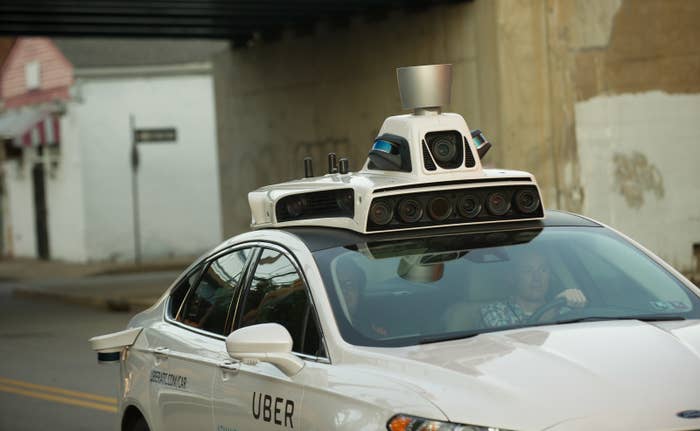
There's another twist in the sprawling self-driving-car trade secrets battle between Uber and Waymo, the autonomous driving company owned by Google's parent company, Alphabet.
Uber says the engineer, who until recently oversaw the company’s self-driving car project, promised Uber he would not bring proprietary information over to the company from his former employer, new court documents filed on Wednesday show.
The filings lay out a timeline showing which Uber employees knew about the actions of the company's former self-driving leader, Anthony Levandowski, who joined Uber after it acquired his autonomous truck startup, Otto. Levandowski previously worked at Google's self-driving car program, which spun off into a new company under Alphabet, called Waymo. Waymo sued Uber in February, alleging that Levandowski stole Waymo's trade secrets to Uber's benefit.
"No one at Uber ever asked Levandowski to download or take Google information or endorsed him doing so," Uber's attorneys wrote in a court filing. "In his employment agreement with Uber, Levandowski also agreed to 'represent and
warrant to the Company that you have returned or destroyed all property and confidential information belonging to any prior employer.'”
On Wednesday, Uber's lawyers said the lawsuit filing in February was the "first time that anyone at Uber learned that Levandowski may have engaged in improper downloading and theft of Google information as alleged by Waymo." Last week, a court filing revealed that Uber said Levandowski had told Uber employees — including former CEO Travis Kalanick, who resigned earlier this month — that he had found five discs containing Google information in his home. But Kalanick told him that Uber didn't want the Google information, and advised him against bringing the discs to Uber, according to court documents. Levandowski later told Uber he had destroyed the discs.
In its own court filing, Waymo said on Wednesday that Levandowski and Lior Ron, Levandowski's Otto cofounder, met with Uber executives as early as Dec. 11, 2015, to discuss LiDAR (Light Detection and Ranging) — a technology that uses rapid pulses of laser light to help self-driving cars measure distance and navigate the world around them. Then on Jan. 4, Levandowski met Uber again for a meeting that Waymo says lasted from 5 p.m. until 1:31 a.m. That day, Levandowski also saved confidential Waymo data to a personal device, Waymo said in a court filing.
"Uber also hasn’t been able to locate text messages from Travis Kalanick to Levandowski, even though it could locate text messages from Levandowski to Kalanick, suggesting that the former were deleted," Waymo wrote in the court filing.
Uber fired Levandowski in May. The company said that he had for months refused to comply with its investigation into Waymo's claims. Levandowski has pleaded the Fifth Amendment in an effort to avoid incriminating himself should the case become a criminal matter. US District Judge William Alsup, the judge presiding over the case, referred it to federal prosecutors on May 11. Alsup said in a court order in May that Waymo's self-driving car secrets may have "seeped" into Uber's designs. Waymo has gone so far as to allege in court that Otto was founded as a ruse to help Uber steal Waymo's technology.
Throughout court proceedings, Uber has maintained that Waymo's information has not crossed into its systems. The ride-hail giant has called its own LiDAR systems — the self-driving technology at hand in the case — "fundamentally different" from Waymo's.
"Uber never used any Google trade secrets or patented technology in the development of the technology at issue in this case," the ride-hail giant's lawyers wrote in a court document filed on Wednesday. "No Uber employee is aware of Levandowski ever using any Google proprietary information in the performance of his duties at Ottomotto or Uber."
